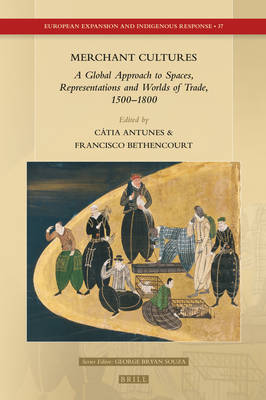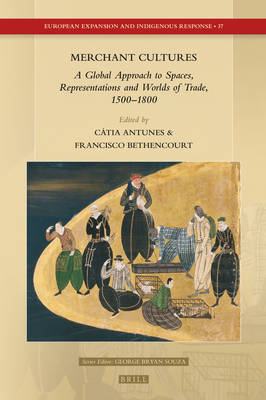
- Afhalen na 1 uur in een winkel met voorraad
- Gratis thuislevering in België vanaf € 30
- Ruim aanbod met 7 miljoen producten
- Afhalen na 1 uur in een winkel met voorraad
- Gratis thuislevering in België vanaf € 30
- Ruim aanbod met 7 miljoen producten
Zoeken
Merchant Cultures
A Global Approach to Spaces, Representations and Worlds of Trade, 1500-1800
€ 227,45
+ 454 punten
Omschrijving
Hans Holbein's Triumphs (1532-1534), commissioned for the headquarters of the Hanseatic League in London and Kano Naizen's The Portuguese namban ('foreigners') painted in 1543 in Japan are representations of worlds of trade, where wealth, speculation, exploitation, poverty, curiosity, encounters and the exotic relate effortlessly. These worlds multiplied in Africa, the America's, Asia and Europe as mercantile cultures met in a globalizing world. From these encounters, power, subjugation and conflict arose as part of the same world as cooperation, cross-culturalism and cosmopolitism. Understanding early modern merchant cultures is thus paramount to comprehend the sinews of globalization before 1800.
Merchants worldwide shared trading interests. These interests shaped a panoply of encounters of mercantile cultures across space and time. This book sketches the commonalities and underlines the differences of mercantile practices and representations during the Early Modern period.
Contributors are: Laurence Fontaine, David Graizbord, William Pettigrew, Edmond J. Smith, Radhika Seshan, Rila Mukherjee, Jurre J. A. Knoest, Noelle Richardson, Joseph P. McDermott, Mark Harberlëin, Francisco Bethencourt, Edgar Pereira, and Germano Maifreda.
Merchants worldwide shared trading interests. These interests shaped a panoply of encounters of mercantile cultures across space and time. This book sketches the commonalities and underlines the differences of mercantile practices and representations during the Early Modern period.
Contributors are: Laurence Fontaine, David Graizbord, William Pettigrew, Edmond J. Smith, Radhika Seshan, Rila Mukherjee, Jurre J. A. Knoest, Noelle Richardson, Joseph P. McDermott, Mark Harberlëin, Francisco Bethencourt, Edgar Pereira, and Germano Maifreda.
Specificaties
Betrokkenen
- Uitgeverij:
Inhoud
- Aantal bladzijden:
- 376
- Taal:
- Engels
- Reeks:
- Reeksnummer:
- nr. 37
Eigenschappen
- Productcode (EAN):
- 9789004506558
- Verschijningsdatum:
- 3/02/2022
- Uitvoering:
- Hardcover
- Formaat:
- Genaaid
- Afmetingen:
- 155 mm x 235 mm
- Gewicht:
- 748 g

Alleen bij Standaard Boekhandel
+ 454 punten op je klantenkaart van Standaard Boekhandel
Beoordelingen
We publiceren alleen reviews die voldoen aan de voorwaarden voor reviews. Bekijk onze voorwaarden voor reviews.










